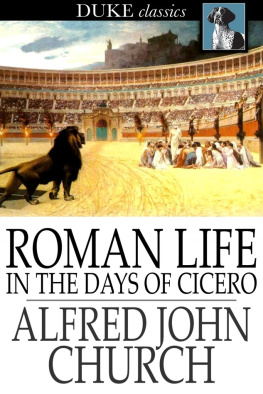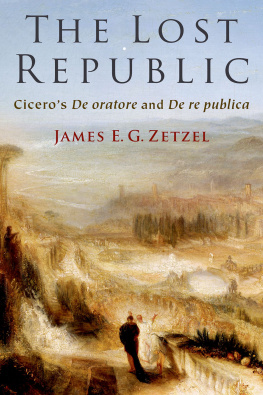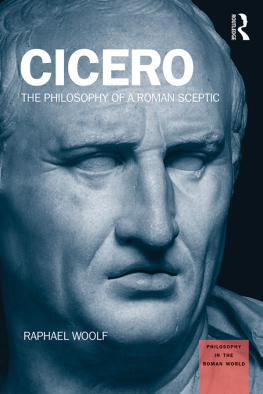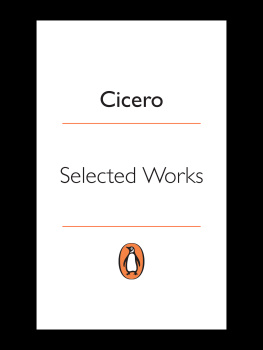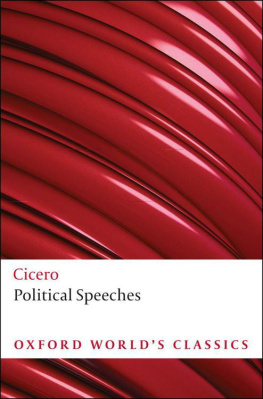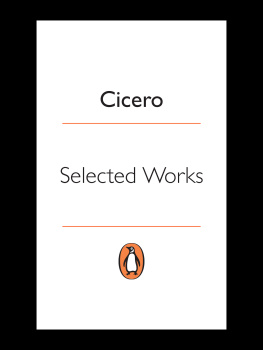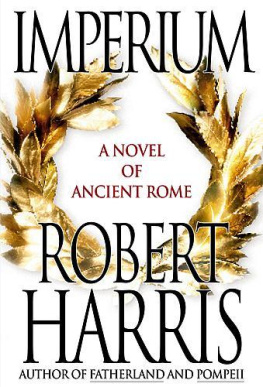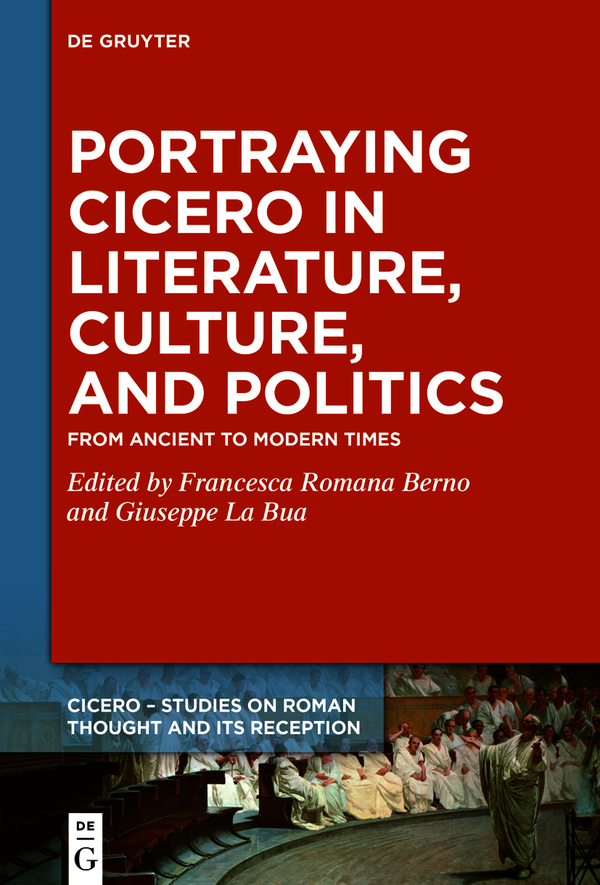CICERO
Studies on Roman Thought and Its Reception
Edited by
Veronica Revello
Ermanno Malaspina
Volume
ISBN 9783110748420
e-ISBN (PDF) 9783110748703
e-ISBN (EPUB) 9783110748888
Bibliographic information published by the Deutsche Nationalbibliothek
The Deutsche Nationalbibliothek lists this publication in the Deutsche Nationalbibliografie; detailed bibliographic data are available on the Internet at http://dnb.dnb.de.
2022 Francesca Romana Berno, Giuseppe La Bua, published by Walter de Gruyter GmbH, Berlin/Boston // The book is published with open access at www.degruyter.com.
This work is licensed under the Creative Commons Attribution 4.0 International License.
Funded by Patrum Lumen Sustine-Stiftung (PLuS)
Introduction
Ciceronis, cuius linguam fere omnes mirantur, pectus non ita |
(Aug. Conf. 3.4.7) |
Augustines sentence, a reassessment of the grandeur of Ciceros eloquence, echoes general admiration for the intellect and mastery of Latin language by the new man from Arpinum. Appreciated as the nomen eloquentiae from Quintilian onwards, remembered and reputed as the supreme model of Latin prose, Cicero embodied the essence of Latinitas, classical Latin whose learning was thought as essential to the intellectual maturation of the young. Augustine was just one of the countless admirers of Cicero. Within an extensive use of Ciceros works, from the lost Hortensius in the Confessions to the De re publica in the recreation of the civitas Dei in the City of God, he looked at Cicero as a source of wisdom and model of correct speaking and writing, re-adapting Ciceros thoughts and rhetorical precepts to Christian philosophy and education and redirecting readings of the republican orator towards the instruction and cultural formation of male lite students.
Yet Augustine also points to another significant aspect of the reception of Cicero, that is, criticism on Ciceros life and morals. As it has been noted, Cicero as a writer was distinct from Cicero as a man. Eulogized as the icon of Roman eloquence, Cicero encountered reproval for his ambiguous involvement in Roman politics and his lack of self-control and steadfastness, constantia. In particular, his dealing with the experience of exile, from the one hand, and the role he played in the transition from the Republic to the principate, on the other, placed him at the heart of a fierce debate, revolving around his perceived absence of morality and the behavior he held towards the leading political figures of his time.
A controversial man and, at the same time, an undisputed model of Latin prose: the reception of Cicero had centered around the oscillation between praise and censure throughout the ages, from Ciceros lifetime to modern times. Modern scholarship has long concentrated on the ambivalent approach to Cicero in early Empire and Late Antiquity. Gowing and McCormack have illuminated significant aspects of the re-use of Cicero in the early Imperial age and during the first centuries of the Christian era. Good attention has also been paid to the detachment of Cicero as a historical figure from Cicero as the embodiment of a classic in the schoolrooms and to the related inclusion of Cicero as idoneus auctor in the school curriculum. Altmans Companion to the reception of Cicero has enormously contributed to our understanding of how the republican orator, statesman and philosopher has been recast and reworked over the centuries. Since the reception of an author starts with the author himself, recent scholarly works have placed emphasis on Ciceros strategy of self-fashioning, showing also that Ciceros construction of his persona, as both ideal orator and politician, serving the republican institution by his words and actions, impacted on later reception and elicited different, contrasting reactions from intellectuals and men of culture over the time.
Adding to this impressive mass of Ciceronian bibliography, this volume collects papers on the reception of Cicero in literature, philosophy and politics in a time span which goes from Late Republic to 21st century. It offers a new and fresh perspective of the multiple, divergent ways by which Cicero was received throughout the centuries. It sees Cicero not as much as an author as a character. The title itself of the volume, Portraying Cicero, intends to attract attention to a specific aspect of the reception of Cicero, that is, the re-creation of the figure of the republican orator in different times and cultures. It is not the reception of Ciceros textual corpus that triggers interest from the contributors to this book. Ciceros literary output, a wondrous assemblage of speeches, philosophical and rhetorical essays, and epistles, serves here as a means of understanding and evaluating the multiplicity of portraits of Cicero throughout the ages. Most significantly, taking Ciceros self-portrait as a jumping-off point for our reconstruction of what it might be called the art of portraying Cicero, we are also able to revisit significant moments of Western culture and politics. As Zieliski clarified in his seminal study more than hundred years now, every age had its own Cicero. Appreciated as an exemplary orator and a master of language from the early empire onwards, Cicero also emerged as a philosopher and a source of wisdom, as it appears in late antiquity and the Medieval times. Cicero as a wise statesman and politician became the dominant paradigm during the Humanism and Renaissance. Likewise, in the Enlightenment and the two following centuries intellectuals and men of culture interpreted Cicero as the embodiment of republican values, the new man ennobling his persona by personal talents. Dictatorial regimes, however, silenced Cicero, never regarded as a politician worth emulating. Amid setbacks and lavish praises, invectives and positive judgments, every age reacted to Cicero with its own sensibility. So, every age had its portrait of Cicero.
Following in the footsteps of Zieliskis suggestion, this volume aims to shed further light on how Cicero was seen and depicted by intellectuals, men of culture, politicians, and artists over the ages. It focuses on the reception of Cicero as a character from old and new perspectives, by approaching Cicero not only as a model of prose writing and icon of Latinitas from early empire to the Renaissance but also examining the influence he exercised on the formation of modern political and philosophical thought. Many essays in this volume point to the role Cicero played in modern and contemporary politics (from the Enlightenment to the 20th century dictatorial regimes). The representation of Cicero in art and his character in modern fiction stories and movies are also considered. Portraying Cicero is a book that offers new possibilities in the study of the reception of the republican orator. It allows scholars to look at the impact exerted by the persona of Cicero on history, literature, rhetoric, politics, art, and culture from antiquity to modern times. A common thread links all the essays in the volume: the art of portraying Cicero is a way through which we are enabled to understand how Cicero was reworked and re-imagined over the times and, above all, how changes in culture, politics, and aesthetics affected divergent responses to the personality and character of the new man from Arpinum.
Portraying (and Defending) Himself
A self-referential author, Cicero devised a coherent long-term strategy of self-fashioning designed to construct his public persona of orator and statesman. Notably, he was a sophisticated narrator of himself. He himself laid the groundwork for canonizing his persona by providing his contemporary and future readers with an idealized version of his public and private life experiences. The opening essay of this volume,



